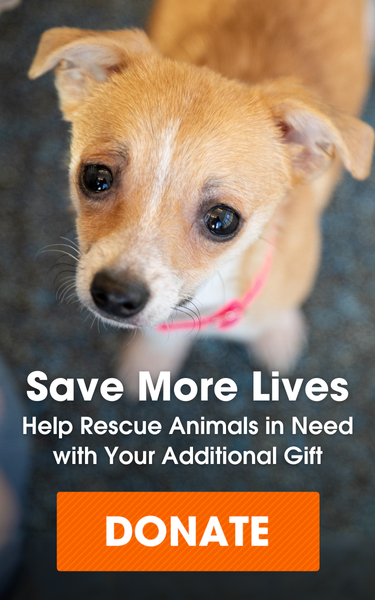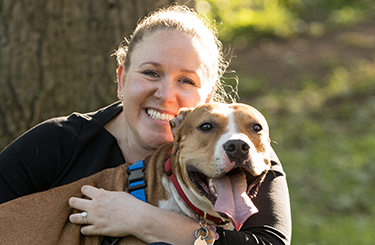
How You Lend a Helping Hoof to Horses
Guardian Exclusive 

We’re not “horsing around” when it comes to our love of equines! In fact, it was a horse who inspired Henry Bergh to devote his energy to the prevention of cruelty to animals and start the ASPCA.
The ASPCA is providing boots on the ground support for horses and their caregivers through our Regional Support Center. This incredible program provides lifesaving resources to equine (horses, mules, and donkeys) owners, and offers valuable services for horses who are on their way to finding new homes.
We spoke with Tom Persechino, Director of Equine Welfare, to give our Guardian members an exclusive firsthand look at the groundbreaking work happening at the Regional Support Center.
Q: | Can you tell us how the Regional Support Center came about? |
A: | When someone requires help to care for or must relinquish their dog or cat, they are usually able to bring their pet to a community animal shelter to receive assistance. When someone is no longer able to keep their horse, there often is nowhere for them to go, leaving those horses at high-risk. Through research, we learned that owners facing personal or economic hardships who needed to surrender an equine had been waiting an average of 15 months to relinquish them. Nearly half of these horses were in such poor physical condition that euthanasia was the most humane option. We hypothesized that if owners had more options, they wouldn’t wait so long to seek help and the horses would have better rehoming and care resources. So, we embarked on a mission to see if and how we could improve welfare, provide options, and prevent suffering for equines. The Regional Support Center first launched in Texas in 2018 to tackle this goal. We were able to help 60 horses over the course of six months in that community. In Oklahoma, we launched an additional Regional Support Center in July 2019, and as of this moment, we have impacted more than 230 horses. |
Q: | Help us understand what the Regional Support Center is and the need it fills for horses. |
A: | The Regional Support Center is a safe place to go when an owner needs help caring for their horse. Once an owner contacts us, we assess the horse’s needs and then provide appropriate services. We use the term “center” but we don’t have a brick-and-mortar facility. The ASPCA operates as a “hub,” working with a group of Right Horse Adoption Partners and a local veterinarian. We also partner with transport providers to move horses to different Right Horse Adoption and Industry Partners who provide amazing rehoming opportunities for horses. |
Q: | Why was the Oklahoma City area selected as the location for the Regional Support Center? |
A: | When our work wrapped up in Texas, we wanted to test what we learned in a second community. Additionally, we wanted to push a model where we transported horses to different Right Horse Adoption Partners. We sought a community with a dense horse population. Oklahoma City, with its central location, high horse population, and set of enthusiastic partners who eagerly stepped up to help, was a logical location. |
Q: | Can you tell us about the process of determining care for these horses in need? |
A: | Initially, we gather information and schedule a free appointment. At the appointment, the horse is examined, and relinquished horses are moved to one of our rehoming partners to start the process of preparing them for adoption into a new home. We provide caring, compassionate euthanasia services when appropriate, and in most cases, we don’t transport the horse which can cause additional pain, stress or discomfort. If, due to financial circumstances, owners need assistance with safety-net veterinary care for their horse, we offer services to help keep equines in their homes. After the horses’ needs are assessed, owners complete a survey that helps us learn more about the needs horse owners face—with a goal of expanding this program to assure a safe place for all horses in need. |
Q: | How are horses prepared for adoption once they are surrendered? |
A: | We see horses of all breeds and ages, in different types of physical condition, and with varying levels of training. After a physical examination by our vet, a basic behavioral profile is completed to help us understand more about the equine. Some horses are immediate candidates for adoption and can be promoted on myrighthorse.org. Some horses need additional training to prepare for their next home. This process can take a few weeks, or several months, with a professional trainer. In some cases, we have horses who need medical rehabilitation. Our veterinarian works closely with our rehoming partner(s) to tend to medical needs or determine how the horse can live a happy, healthy life in a new home with ongoing support. |
Q: | How does the Regional Support Center work with rehoming partners? |
A: | A wonderful aspect of the Regional Support Center is that we have been able to work with both local and out-of-state rehoming partners. Like dogs and cats, there are certain parts of the country where a particular type of horse is in high demand, or where there is a surplus of adopters. We’re piloting transporting horses to find loving homes more efficiently. For example, we moved several older horses to a partner in Minnesota that does a fantastic job adopting or fostering horses who are suited to non-riding homes. We have moved horses to Texas and Colorado where we have partners with on-site trainers, so that the horses can prepare for adoption and find wonderful homes quicker. We’ve also moved horses to partners that specialize in adopting particular breeds of horses, and we have become quite skilled at receiving and finding homes for miniature horses! |
Q: | Why are community programs like this so important for vulnerable horses? |
A: | The success we have seen with dogs and cats is a result of animal shelters becoming community resources, increased public awareness around pet adoption, and relocation of cats and dogs to other areas of the country where they have a better chance of adoption. We envision using similar tactics to help equines find new homes and careers. Our pilot Regional Support Center models are teaching us a tremendous amount about the people and the horses in need who utilize these services. To help vulnerable horses, we must be being fully engaged and service the needs of the community. Through this work every horse, no matter their location or needs, has options that help them transition more easily to new families or receive kind, caring, and compassionate medical services if needed. |
Q: | Are there any plans to expand this work in the future? |
A: | Yes, and we are on our way! Last year, we were able to work with Humane Society of North Texas and SPCA-Texas to open an equine support center which services 19 counties in the North Texas area. We are also exploring opportunities to build upon our learnings from the Regional Support Center to grow our direct impact. |


